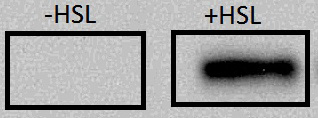Team:Washington/Gram Negative/Test
From 2010.igem.org
(Difference between revisions)
(→PCR testing for insertion) |
|||
| Line 25: | Line 25: | ||
</html> | </html> | ||
<!---------------------------------------PAGE CONTENT GOES BELOW THIS----------------------------------------> | <!---------------------------------------PAGE CONTENT GOES BELOW THIS----------------------------------------> | ||
| + | =Western blotting for proper Tse2 expression= | ||
| + | [[Image:Washington_Tse2_Tsi2_Western.jpg]] | ||
=PCR testing for insertion= | =PCR testing for insertion= | ||
We want to test for gene insertions and recombinations at several steps of our project. PCR is the easiest and fastest way to determine the success of Recombineering. | We want to test for gene insertions and recombinations at several steps of our project. PCR is the easiest and fastest way to determine the success of Recombineering. | ||
Revision as of 03:40, 6 October 2010
Western blotting for proper Tse2 expression
PCR testing for insertion
We want to test for gene insertions and recombinations at several steps of our project. PCR is the easiest and fastest way to determine the success of Recombineering.
Using a set of primers flanking the galK cassette, we tested the insertion on our recombinants. galK is around 1200 base pairs in size, so we would expect the recombinant PCR to be about 1200 bp larger than the non-recombinant. Indeed, this is exactly what we saw.
SDS-PAGE Protein Array
Hcp secretion is the hallmark of a working T6SS. We plan to use SDS-PAGE to confirm our promoters.
Competition Arrays
Once we have a working T6SS in E. Coli, we can use GFP-labelled organisms to test the competitive advantage of our T6SS strain vs. non-T6SS organisms.
 "
"


